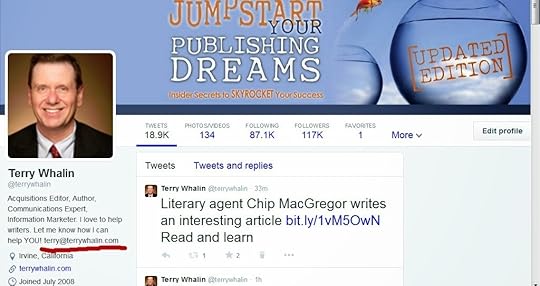W. Terry Whalin's Blog, page 59
August 19, 2014
Showing Up Is The First Step
It may seem pretty basic but in the writing world (as well as other aspects of life), the first step is simply showing up. If a magazine requires the writer to send a one-page query letter, then you will need to learn how to write a query, then send an appropriate pitch to the publication. If you take one step, and then the next step, you will give yourself the best possible opportunity for success.
Many people wonder how I've managed to get my writing into more than 50 magazines or to write more than 60 books. I have never claimed to be a fantastic writer but I am a very consistent writer. If I'm at a conference talking with an editor about ideas and the editor says, “That's a great idea, Terry. Write that up and send it to me.” Immediately after the meeting, I make a note, go home and write up my idea and send it to that editor.
Over the last few years, I've met with hundreds of writers at various conferences. These writers have pitched their idea either in writing or orally and I've told them, “Terrific idea. Write that up and send it to me.” Yet few people follow through and send me their material. Showing up is the first step.
 Wednesday night (August 20th), you have one of these opportunities—but only if you show up to the live event. I'm going to be interviewing the Morgan James publisher, Rick Frishman. The questions for this teleseminar are not coming from me or from Rick but from the audience. Rick has been involved in the various aspects of book publishing for many years. Twice a year, Rick pulls together the illustrious faculty of Author 101 University, which is one of the premier writers conferences in the United States. It is not a Morgan James event—but there are a number of Morgan James authors at the event. Editors and agents from many different area of publishing attend Author 101 University.
Wednesday night (August 20th), you have one of these opportunities—but only if you show up to the live event. I'm going to be interviewing the Morgan James publisher, Rick Frishman. The questions for this teleseminar are not coming from me or from Rick but from the audience. Rick has been involved in the various aspects of book publishing for many years. Twice a year, Rick pulls together the illustrious faculty of Author 101 University, which is one of the premier writers conferences in the United States. It is not a Morgan James event—but there are a number of Morgan James authors at the event. Editors and agents from many different area of publishing attend Author 101 University.
While I'm confident Rick will provide great information during our 70–minute teleseminar, something else is happening during this session. Throughout the teleseminar, Rick will be giving away some registrations for the October Author 101 University event. To win one of these registrations, you must take the first step—show up at the live event and be prepared to possibly win.
Will you take the first step to show up? I encourage you to register. If you don't have a question, then put “no question” and keep going through the simple registration process until you reach the confirmation page where you can listen to the teleseminar or dial in on your telephone.
Hope to speak with you soon.


Many people wonder how I've managed to get my writing into more than 50 magazines or to write more than 60 books. I have never claimed to be a fantastic writer but I am a very consistent writer. If I'm at a conference talking with an editor about ideas and the editor says, “That's a great idea, Terry. Write that up and send it to me.” Immediately after the meeting, I make a note, go home and write up my idea and send it to that editor.
Over the last few years, I've met with hundreds of writers at various conferences. These writers have pitched their idea either in writing or orally and I've told them, “Terrific idea. Write that up and send it to me.” Yet few people follow through and send me their material. Showing up is the first step.
 Wednesday night (August 20th), you have one of these opportunities—but only if you show up to the live event. I'm going to be interviewing the Morgan James publisher, Rick Frishman. The questions for this teleseminar are not coming from me or from Rick but from the audience. Rick has been involved in the various aspects of book publishing for many years. Twice a year, Rick pulls together the illustrious faculty of Author 101 University, which is one of the premier writers conferences in the United States. It is not a Morgan James event—but there are a number of Morgan James authors at the event. Editors and agents from many different area of publishing attend Author 101 University.
Wednesday night (August 20th), you have one of these opportunities—but only if you show up to the live event. I'm going to be interviewing the Morgan James publisher, Rick Frishman. The questions for this teleseminar are not coming from me or from Rick but from the audience. Rick has been involved in the various aspects of book publishing for many years. Twice a year, Rick pulls together the illustrious faculty of Author 101 University, which is one of the premier writers conferences in the United States. It is not a Morgan James event—but there are a number of Morgan James authors at the event. Editors and agents from many different area of publishing attend Author 101 University.While I'm confident Rick will provide great information during our 70–minute teleseminar, something else is happening during this session. Throughout the teleseminar, Rick will be giving away some registrations for the October Author 101 University event. To win one of these registrations, you must take the first step—show up at the live event and be prepared to possibly win.
Will you take the first step to show up? I encourage you to register. If you don't have a question, then put “no question” and keep going through the simple registration process until you reach the confirmation page where you can listen to the teleseminar or dial in on your telephone.
Hope to speak with you soon.


Published on August 19, 2014 21:33
June 25, 2014
3 things you can do today to get amazing book blurbs tomorrow
By
Sandra Beckwith
What’s
worse than not making the effort to get glowing blurbs for your book before it’s
published?
Not
planning ahead to make sure that you get them from the most impressive and
influential people possible.
While
you can completely “cold call” the rock stars of your genre or industry and get
cover blurbs that will make your mother proud, you’ll have a greater success
rate – and work half as hard at it – if you take a few steps in
advance.
Why?
Because you’re more likely to get a positive response from someone who knows
your name than from someone who has never heard of you.
When
it’s time to ask people to write blurbs – those endorsements and testimonials
you place on your book’s cover and inside front pages or on your retail sales
page – you will be talking to people who “know” you instead of people who think,
“Who is this person?”
Maybe
you’ve been in this situation yourself before: Two people ask you for a favor.
One is someone you’ve heard of and the other is a stranger. If you’re like most,
you’re probably quicker to respond favorably to the person you know of than the
person you don’t. That’s just human nature.
Take
action now
Fortunately,
you can take specific actions now so that you’re no stranger to the people you
want to endorse your book in a few months. And the good news is that it’s not
hard or painful.
Here
are three things you can do today that will pay off when you’re ready to make
that important request later.
1.
Socialize online.
Connect
on social media, but make sure that you’re using the right social media
networks.
Going
after high-profile foodies or chefs? Look on Pinterest. Are the people who will
blurb your book in the business world? Check out LinkedIn. Looking to connect
with Millennials? Try Twitter, Instagram, or Tumblr.
Follow
them. Retweet or share what they share. Comment on their status updates and blog
posts. Use your best judgment about how much of this is enough and how much is
“too much.” You don’t want the person to feel like they’re being stalked, but
you do want them to learn your name.
2.
Socialize in person.
Is
your dream blurber making a presentation near where you live? Attend and
introduce yourself before or after.
Compliment the speaker and presentation in a
follow-up e-mail, mentioning something specific that resonated with
you.
When
author Minda Zetlin attended a conference featuring Tom Peters as a speaker, she
was smart enough to introduce herself on site and ask if he’d write a blurb for
her book. To her delight, he agreed to do it.
“It
wouldn’t have occurred to me to ask him if I hadn’t seen him speak,” she
said.
Attend
networking events where you might meet someone who will be an ideal endorser.
Register for key conferences, seminars, and trade shows where you will meet the
right people while you learn even more about your topic and
audience.
3.
Ask for introductions.
Do
you know somebody who knows somebody who knows somebody? Ask for an in-person or
virtual introduction. (This is a particularly good approach when you want blurbs
from celebrities and other famous people.)
Don’t
even think of leveraging the introduction to request a favor immediately,
though. Help that person get a sense of who you are and what you do, first. Be
generous with your time and information before ever expecting anything in
return. You might send that person links to articles you think he might be
interested in, or compliment her when you see she’s been quoted by the press.
Notice what others do to keep you engaged with them – in a good way – and
emulate that.
Add
structure now that will pay off later
Do
more than connect with these people you think will help you sell more books when
they provide an endorsement.
Catalog
or document your contacts, too, in an Excel file or a Word grid. Record their
name, contact information, why they will be good “blurbers,” and how and when
you’re staying in touch with them. You’ll then be able to use that documentation
to your advantage later, when you ask them to write an endorsement for your book
that will influence the people you know will benefit from your knowledge or
story.
What’s
holding you back from going after your dream endorsement?
About
the author
 Sandra
Sandra
Beckwith is an award-winning former publicist who now teaches authors how to
publicize, promote, and market their books through her training programs and
free “Build Book Buzz” newsletter. Sandra’s new multi-media program,
“ Blurbs,
Endorsements, and Testimonials: How to Get Experts, Authorities, Celebrities,
and Others to Endorse Your Book ,”
takes the guesswork, uncertainty, and mystery out of this important process and
shows you how to get the blurbs of your dreams. Use coupon code BLURB before
June 27 to save 33% off the already low purchase
price.


Sandra Beckwith
What’s
worse than not making the effort to get glowing blurbs for your book before it’s
published?
Not
planning ahead to make sure that you get them from the most impressive and
influential people possible.
While
you can completely “cold call” the rock stars of your genre or industry and get
cover blurbs that will make your mother proud, you’ll have a greater success
rate – and work half as hard at it – if you take a few steps in
advance.
Why?
Because you’re more likely to get a positive response from someone who knows
your name than from someone who has never heard of you.
When
it’s time to ask people to write blurbs – those endorsements and testimonials
you place on your book’s cover and inside front pages or on your retail sales
page – you will be talking to people who “know” you instead of people who think,
“Who is this person?”
Maybe
you’ve been in this situation yourself before: Two people ask you for a favor.
One is someone you’ve heard of and the other is a stranger. If you’re like most,
you’re probably quicker to respond favorably to the person you know of than the
person you don’t. That’s just human nature.
Take
action now
Fortunately,
you can take specific actions now so that you’re no stranger to the people you
want to endorse your book in a few months. And the good news is that it’s not
hard or painful.
Here
are three things you can do today that will pay off when you’re ready to make
that important request later.
1.
Socialize online.
Connect
on social media, but make sure that you’re using the right social media
networks.
Going
after high-profile foodies or chefs? Look on Pinterest. Are the people who will
blurb your book in the business world? Check out LinkedIn. Looking to connect
with Millennials? Try Twitter, Instagram, or Tumblr.
Follow
them. Retweet or share what they share. Comment on their status updates and blog
posts. Use your best judgment about how much of this is enough and how much is
“too much.” You don’t want the person to feel like they’re being stalked, but
you do want them to learn your name.
2.
Socialize in person.
Is
your dream blurber making a presentation near where you live? Attend and
introduce yourself before or after.
Compliment the speaker and presentation in a
follow-up e-mail, mentioning something specific that resonated with
you.
When
author Minda Zetlin attended a conference featuring Tom Peters as a speaker, she
was smart enough to introduce herself on site and ask if he’d write a blurb for
her book. To her delight, he agreed to do it.
“It
wouldn’t have occurred to me to ask him if I hadn’t seen him speak,” she
said.
Attend
networking events where you might meet someone who will be an ideal endorser.
Register for key conferences, seminars, and trade shows where you will meet the
right people while you learn even more about your topic and
audience.
3.
Ask for introductions.
Do
you know somebody who knows somebody who knows somebody? Ask for an in-person or
virtual introduction. (This is a particularly good approach when you want blurbs
from celebrities and other famous people.)
Don’t
even think of leveraging the introduction to request a favor immediately,
though. Help that person get a sense of who you are and what you do, first. Be
generous with your time and information before ever expecting anything in
return. You might send that person links to articles you think he might be
interested in, or compliment her when you see she’s been quoted by the press.
Notice what others do to keep you engaged with them – in a good way – and
emulate that.
Add
structure now that will pay off later
Do
more than connect with these people you think will help you sell more books when
they provide an endorsement.
Catalog
or document your contacts, too, in an Excel file or a Word grid. Record their
name, contact information, why they will be good “blurbers,” and how and when
you’re staying in touch with them. You’ll then be able to use that documentation
to your advantage later, when you ask them to write an endorsement for your book
that will influence the people you know will benefit from your knowledge or
story.
What’s
holding you back from going after your dream endorsement?
About
the author
 Sandra
Sandra Beckwith is an award-winning former publicist who now teaches authors how to
publicize, promote, and market their books through her training programs and
free “Build Book Buzz” newsletter. Sandra’s new multi-media program,
“ Blurbs,
Endorsements, and Testimonials: How to Get Experts, Authorities, Celebrities,
and Others to Endorse Your Book ,”
takes the guesswork, uncertainty, and mystery out of this important process and
shows you how to get the blurbs of your dreams. Use coupon code BLURB before
June 27 to save 33% off the already low purchase
price.


Published on June 25, 2014 15:39
June 6, 2014
I'm Moving Back to Colorado (Again)

“Don't you live in Arizona?” a friend asked me recently.
“No, I've been living in Southern California for the last two years,” I explained. We moved here to be near our youngest daughter. It
turned out Kim had twin boys last October and added to her two year old. We've
been able to help out over the last two years during a critical time in
life.
I often spend my days on the phone and email speaking with different authors
because of my responsibilities as an acquisitions editor at Morgan James. I was
telling another author about how we were going to be moving again. She asked if
I was going to have time to get together with her for breakfast or coffee. I
said yes and I was speaking with this author on her Los Angeles cell number—but
she was in Arizona. So we didn't get together. The two conversations showed me
many people are confused about where I live.
I understand the confusion because I work for a New York publisher, I have a
New York phone number and extension on my business card. Yet I have been living
in Southern California. Two years ago we sold our home in Arizona and have been
renting—which makes moving a bit easier. We are in the process of moving again
for the third time in three years. Whew.

Moving does strengthen your organization skills. It's fruitless to keep
moving things that you don't use on a regular basis.
Our family takes a number of magazines—several of them weekly magazines. I've
learned the majority of my addresses can be easily changed online. I did a
google search for “Name of the magazine” + “customer service” and almost
immediately I went to the right location. Entering my account number and zipcode
my current address came up, then I could change it to our new address. If you
are moving, I recommend you change the addresses online since it will be
immediate and quicker than other methods.
We are moving to Highlands Ranch, Colorado where we have two children and
five grandchildren. Other children are nearby and we will see them more often in
Colorado. We've lived in Colorado Springs two other times so going back to
Colorado seems familiar. Instead of Colorado Springs, we will be living in the
Denver area.
Our movers will arrive tomorrow but already I've taken some public steps to
change my address. First, I've changed the contact details in my LinkedIn
profile. Also I've changed my location on twitter. Finally I've changed the contact page on my
terrywhalin.com website.
I do not have all of my addresses changed but I have changed several of the
critical ones. For example, I have a regular newsletter which reaches many
people. I will not be changing that address until I reach Colorado early next
week.
In the last ten years, many activities have shifted to the Internet. With the
move, my work with Morgan James Publishing will continue without interruption.
Thanks to email and cell phones, I'm fairly easy to reach. Here's the key: I'm
reachable when I want to be reached. I can ignore a call and let the call go to
voice mail then call the person back when it fits my schedule.
All too often people feel like technology drives and controls their world. In
reality, technology can help you control your environment if you use the tools
that you have been given. Lots of transition is in the works here. It's been ten
years since we've lived in Colorado where there are distinct seasons (spring,
summer, fall and winter). It is going to be exciting—and a bit disruptive for a
few days but then everything will settle down.
How do you handle the transitions or moves of life? I hope you handle the
changes with grace and high expectation.



Published on June 06, 2014 21:53
May 27, 2014
Watch Your Subject Lines

Over a year ago, I attended the annual American Society of Journalists and Authors Conference. I
moderated a panel on how to get on the New York Times bestseller list during the conference.
Because I was at the event, I was able to attend a terrific workshop from Sree Sreenivasan (@sree). He is a remarkable
instructor in the area of social media and someone that I recommend you
follow his wise advice.
Sree called to our attention that a Senior Feature Writer for the New
York Times has his email address in his twitter profile. Why does he
publicize his email address? Sree answered, “It's because he wants to be
accessible to the public and if you have a feature story idea, he wants you to
be able to reach him through his email.”
I thought it was a great idea. I want to be accessible to others. During this
workshop I added my email address to my twitter profile. It did make me more
accessible and on a regular basis (almost daily and sometimes several times a
day), I receive emails from writers who wonder what type of help I can give
them. Some of them ask for a specific type of help such as in marketing or
promotion. I answer each email and send them to material in my blog or free teleseminars that
I've done or other resources. It does not take much of time because I have a
ready answer for these questions.
I'm delighted to help these people and it's one of the reasons I wrote these
resources on the first place—to help these writers.
Recently I got one of these requests and it got me thinking about the subject
lines in email here the email I received:
Subject Line: Important
Hello Terry,
I hope you are well.
My name is ________, I am a student at ________________. I live in _____. I
would like you to call me at ______. To discuss a book that I am writer.
Respectfully yours,
Sent from my iPhone
Yes that is the actual email and subject line. I took out the specifics and
left blanks. I wrote back to this writer and said “As important as you believe
your email is, I will not be calling you to talk with you about your book.” Then
I pointed out my various online resources for this writer to use. Calling on the
phone might be something they want but most editors and literary agents are
difficult to get on the phone and then they limit their time on the phone
because they are focused on their work.
A random phone call may or may not (usually not) develop into a publishable
project. This writer didn't look promising to me—especially with the
ungrammatical sentence that she concluded her email.
Here's several tips for crafting the words in your subject lines:
1. Make Them Specific & Interesting. Give me a reason to open your
email. I get a lot of email. Many people get a lot of email so you have to be
mindful of this fact when you write your subject line.
2. Do not Be Generic because you are “asking” for deletion.
3. Think about the person Receiving the Email. As you craft the
subject line, ask yourself if they get a lot of email or a little bit? How can
you help them to be eager to open your email? It's with your few words for the
subject.
4. Use Power Words That Demand to Be Opened. Begin to analyze your own
email and notice which subject lines catch your attention and which ones do you
automatically delete? It will help you with your own emails.
At the end of the day, I'm delighted to have would-be writers email me. My
email address remains in my twitter profile. I have met some amazing people
through my work on twitter.



Published on May 27, 2014 17:57
May 15, 2014
When You Hit A Bad Day

Let's face it head on. Everyone has a bad day. You know what I'm talking
about.
When you walk out to your car and see the tire is flat—and naturally you are
trying to rush off to some important meeting.
Or your computer crashes in the middle of an important rewrite on an article
or book and you lose hours of work because you didn't back it up.
Or you get sick and land in bed. Or someone in your family gets sick. Or a
dear friend suddenly dies.
Or a friend or a co-worker promises they will do something—and they don't. So
it creates huge amounts of unexpected work for you or a project you were
counting on completing didn't happen.
These various possibilities that I just listed are a fraction of what happens
to everyone. The unexpected happens to each of us with our writing and
publishing lives.
Here's the critical question for you: when you meet one of
these difficulties, does it totally derail you so you don't complete what needs
to be written. Or do you rise to the challenge and continue forward with your
writing?
Something derails writing for a day. Do you shake it off and return to it the
next day? Or do you set it aside and say, the time must not be right? There is a
time and place to persevere.
This month many publications and programs have been celebrating the storied
career of journalist Barbara Walters. At 84, she is retiring this week from 17
years on The View. This week I read an article about Barbara Walters
in AARP magazine, which claims have the world's largest circulation at 24.4
million (more than three times the circulation of Reader's Digest).
In the AARP article called What I Know Now: Barbara Walters, she shares the secrets of
her success saying, “I think the secret of my success is that I persevered. I
didn't give up. I didn't say, 'This is a lousy job, and I'm unhappy, and I'm
going to quit.' I went through the tough times, and they were tough. And I was
fortunate that I came out the other end.” I admire Barbara Walter's
perseverance.
Recently my agent friend Steve Laube wrote an article What to do when technology fails? I did feel bad for the
author who lost the entire manuscript on a computer the day it was due at the
publisher. As a result the book was canceled. Buried in the story was the fact
the author had missed the third extension. What happened in the case of
the first two extensions? This story wasn't told.
About ten years ago when I started working as an editor on the inside of
publishing houses, I learned that writers are notoriously late. I've often been
the editor who the author calls and tells about their bad day then asks for an
extension. Publishers know about bad days so they often build some flexibility
into the deadline.
Yet writers should not count on that flexibility or extension. Here's how to
distinguish yourself as a writer and make editors love you: turn in your writing
when you promise to turn it in—with excellence.
It's one of the elements that I've done over and over with my writing
deadlines—met them. I recall writing one section of a book where I stayed at my
computer all night in order to meet the deadline. At that time, I had a
full-time editorial job and I had taken on a book project to write.
When I didn't come to bed, in the middle of the night my wife came down to my
office to see if everything was OK. Everything was fine except I had to meet a
deadline and did not make it to bed that particular night. I fired off my
deadline material to the editor, cleaned up and went off to my full-time job.
Yes, I drank some extra caffeine that day and was tired but I delivered what I
promised to the editor and put in a full day at work. I've only done it once so
I don't make a regular habit of such actions.
How do you handle bad days? Does it derail you so you don't complete what
needs to be written or do you shake it off and continue?



Published on May 15, 2014 18:04
April 27, 2014
A Celebration of Books!
April
is the first ever Wimpy Kid Month, which will become an annual event. Tomorrow,
April 28th, the cover and title for the 9th book in the
Diary of a Wimpy Kid will be revealed in a free
webinar.
This
event reminds me of an amazing experience that I had with books last
October. I
love printed books. I've written numerous books. For years as an acquisitions editor at Morgan James, I’ve helped others get
their books into print.
Yet
something was missing from my experience. I had never toured a book
manufacturing plant. I wanted to see how books were assembled from large rolls
of paper to books you can hold in your hand.

Last
October I finally had that magical experience. I spoke at the Wisconsin Writers Association
and I knew one of the largest book manufacturers was in Stevens Point,
Wisconsin. I arranged a tour of Worzalla Book Publishing which has been operating since 1898.
The plant runs 24 hours a day and seven days a week.
You’ve
got to wear your walking shoes because the plant is over 300,000 square feet of
building space. They were running many different print jobs as I walked through.
Some machines were binding paperbacks while others were adding the jackets on
hardcovers. Others were assembling the signatures of books into stacks and
another machine added the hardcover binding.

The
large project in the plant was printing six million copies of Book #8 of the
Wimpy Kid Diary books. I was not allowed to take any photos of this
printing because the book is embargoed and will not release in the bookstores
until November 2, 2013. Yet six million books are not magically printed
overnight and shipped to stores around the country. It happens ahead of time in
book plants like Worzalla.
 I saw
I saw
the book in pieces in some places and at other machines like in the bindery,
they were completely assembled and packed into boxes and on pallets for
shipping.
With
permission, I took a few photos to include with this post. The rolls of paper
are massive and weighed 1300 to 1600 pounds EACH. Notice the tall stacks in
their warehouse. These rolls of paper become books.
I’ve
been wanting to visit this plant for years and last fall, one of my dreams came
true. My plans paid off and I managed to see how books are
manufactured.
What
are you dreaming of seeing manufactured? How can you take action to set
something into motion where you can see this take place? Or maybe it is some
trip you want to take. How will you achieve this dream in the days
ahead?




is the first ever Wimpy Kid Month, which will become an annual event. Tomorrow,
April 28th, the cover and title for the 9th book in the
Diary of a Wimpy Kid will be revealed in a free
webinar.
This
event reminds me of an amazing experience that I had with books last
October. I
love printed books. I've written numerous books. For years as an acquisitions editor at Morgan James, I’ve helped others get
their books into print.
Yet
something was missing from my experience. I had never toured a book
manufacturing plant. I wanted to see how books were assembled from large rolls
of paper to books you can hold in your hand.

Last
October I finally had that magical experience. I spoke at the Wisconsin Writers Association
and I knew one of the largest book manufacturers was in Stevens Point,
Wisconsin. I arranged a tour of Worzalla Book Publishing which has been operating since 1898.
The plant runs 24 hours a day and seven days a week.
You’ve
got to wear your walking shoes because the plant is over 300,000 square feet of
building space. They were running many different print jobs as I walked through.
Some machines were binding paperbacks while others were adding the jackets on
hardcovers. Others were assembling the signatures of books into stacks and
another machine added the hardcover binding.

The
large project in the plant was printing six million copies of Book #8 of the
Wimpy Kid Diary books. I was not allowed to take any photos of this
printing because the book is embargoed and will not release in the bookstores
until November 2, 2013. Yet six million books are not magically printed
overnight and shipped to stores around the country. It happens ahead of time in
book plants like Worzalla.
 I saw
I saw the book in pieces in some places and at other machines like in the bindery,
they were completely assembled and packed into boxes and on pallets for
shipping.
With
permission, I took a few photos to include with this post. The rolls of paper
are massive and weighed 1300 to 1600 pounds EACH. Notice the tall stacks in
their warehouse. These rolls of paper become books.
I’ve
been wanting to visit this plant for years and last fall, one of my dreams came
true. My plans paid off and I managed to see how books are
manufactured.
What
are you dreaming of seeing manufactured? How can you take action to set
something into motion where you can see this take place? Or maybe it is some
trip you want to take. How will you achieve this dream in the days
ahead?



Published on April 27, 2014 09:08
April 13, 2014
Why Words Are Magic

Dennis Welch knows the right words can be magic. The challenge for anyone who writes is selecting the right words. In this hurry-up-and-get-it-out world, "SO...WHAT ARE YOU SAYING?" is a clarion call to choose your words with care.
In places, the storytelling and writing in these pages is laugh-out-loud funny. Yes, I laughed as I read several of the stories--a real testament to the craft inside this little book. The lessons for any writer or communicator are profound. Read this book with a highlighter so you can return to the messages and think about them again and again.
To give you an example of the insights in this book, I’m going to excerpt a few words from one of the final sections called “How You Can Make Magic.” Dennis gives a key principle, “Don’t rush unless you have to.” He writes, “Look, I know everybody is in a hurry. Hardly anybody sits down to write anything for fun. You probably have a reason why you need to communicate more clearly and more effectively. And, you probably have a deadline. You’re not doing this for your health.”
“We live in a fast-paced, get-it-done-yesterday environment, and the biggest danger we fast is speeding along and just getting stuff done so we can mark it off our list.”
“Huge mistake.”

“Take your time. Think through your message. Plan out your writing time, if you can, to allow for some breathing room. Write it down, and then go back later and re-read it with fresh eyes. Check the taxonomy and the tone. I heard someone say once it’s hard to read the label when you’re inside the bottle. That happens a lot. You’re an expert and you use those terms every day in your work and life. But, are you writing to the uninitiated or someone who’s never heard of this stuff (but should)?”
“We all have blind spots as writers. Take the time to let someone else look it over if you can.” (Page 127)
I gave one little snippet of the type of wisdom packed into this little volume. I've got shelves of how-to-write books. In fact, I've given away many more boxes of how-to-write books that aren't on my shelves but I've read through the years. "SO...WHAT ARE YOU SAYING?" is among the best of these books. There are simple, profound insights that are worth reading repeatedly. Dennis Welch has written what I hope turns into a classic. I highly recommend this book.
In fact, I encourage you to get a copy for yourself and a second one to pass to a writer friend. They will appreciate your thoughtful gift.



Published on April 13, 2014 09:00
April 10, 2014
Read the Fine Print

I subscribe to a number of magazines and read them cover to cover. Admittedly
I will skim parts of them but I learn a great deal in this process which is a
regular part of my reading life.
I'm one of millions of subscribers to Readers Digest magazine. For
many years I've faithfully read this publication. In the January issue, I was
drawn to A full color ad and the words, “Love to Write? Pursue Your Passion with
LifeRich Publishing and Reader's Digest.” I scanned my page and have included it
with this article.
The page was positioned near the front of the magazine near the index to
catch a lot of attention. Because I'm constantly reading about publishing and
had never heard about LifeRich Publishing, I read a little closer.
Then I located the
publishing connection—see the second image that I'm including which says,
“The Reader's Digest Association Inc and Author Solutions LLC.”

In the next few months, I'm almost certain to meet authors who will claim
they have been published by Reader's Digest through LifeRich Publishing.
It is the same way writers will claim they have been published by Thomas Nelson through WestBow or Lifeway through CrossBooks or Guideposts through Inspiring Voices.
There are at least 20 different company names for the various Author Solutions
companies. I've met numerous authors who have paid $8,000 to $20,000 to these
publishers and have many books in their garage. The authors who took this leap
did not read the fine print of their agreement.
These companies are only online—i.e. no book placed inside brick and mortar
bookstores. Yes there are some exceptions but of the thousands of titles they
are producing each year, it is only online sales.
I have written about this issue in the past. Make sure you carefully read this Publisher's Weekly article from 2012. Notice this sentence in
the article about their employees, “Its workforce totals 1,565 full-time
employees with by far the greatest number, 1,215, located at its facilities in
the Philippines which handles not only production but sales and marketing
as well.”
The volume of books these Author Solutions companies are producing is staggering. Just
check out this article
from 2011 which shows they produced over 47,000 titles (yes different
books). These numbers have only increased in the last few years.
Recently I heard Mark Coker, the CEO of Smashwords speak at the San Francisco
Writers Conference. He said, “Author Solutions has put the capital V in Vanity
Publishing.” Coker was talking about the cost of publishing for authors and
how they are paying these various Author Solutions companies with very little
return on their investment. There is a reason that Penguin purchased Author
Solutions for over $116 million. Large amounts of money here but not necessarily
beneficial for the authors.
Last fall, I wrote an article about how authors can avoid being cheated. I raised a series of
questions that many authors never ask when they are considering publishing. If
more people ask the questions, they will be wiser about what they are doing. It
grieves me to see authors spend a great deal of money with the expectation their
book is going to sell and become a bestseller—yet in reality they haven't asked
enough questions or the right questions to make an informed business decision.
Yes publishing a book with anyone is a business decision. Ask lots of
questions to make sure you make the right decision.


Published on April 10, 2014 22:21
April 5, 2014
The Power of Consistency

If you want to get your writing published, are you consistently working at that goal? From interviewing more than 150 bestselling author, many authors set a specific word count they want to produce in a day or a week. With this goal firmly in place, they sit in their chair and put their fingers on the keyboard and crank out words toward their goal. There is immense power in working toward a goal on a consistent basis.
If you want to write a novel, then you need to be writing ___ words a day consistently for __ days to achieve this goal.
If you want to be published in magazines, then you need to be writing query letters to editors and pitching your ideas on a regular basis. Then when an editor gives you the assignment, you consistently write excellent material and return it on their deadline.
If you want to write a nonfiction book, then you need to create a riveting proposal which captures the attention of literary agents or editors. A good proposal isn't created in a single session but takes time and energy to craft one.
If you want to build your social media presence in the marketplace, then you need to consistently work at growing your Facebook friends or increasing your twitter followers. I've written about my methods to do this in the past. It is one of the reasons that in the past few days I've gone over 100,ooo twitter followers. I've worked at this goal on a regular basis.
Besides working to increase my numbers, I'm also delivering good content to my twitter followers and my Facebook friends and my LinkedIn connections.
At a recent writers conference, I met with a writer who thanked me for the good content that I put on my twitter feed. She had noticed that it was consistently worth reading. I appreciated this feedback. It is true that I do not spend a great deal of time on what I post on twitter—but I am consistent. It's why I've tweeted almost 18,000 times since the summer of 2008. There is power in consistency.
If you want to be selling your book to people and having them talk about it, then you need to be consistently working to build a larger audience and get in front of people and the media. Whatever your goal, I encourage you to follow what Jack Canfield calls The Rule of Five. In this short video (less than two minutes), Jack explains the rule and how it will help you tap into the power of consistency to accomplish your goals and dreams.
Consistency doesn't have to take a lot of time but the results will add up for you. Eventually you will achieve your goals if you take regular and consistent action.



Published on April 05, 2014 09:07
March 29, 2014
Get My Personal Insights At These Events

Throughout my years in
publishing, some of my greatest insights have come from attending a small
group seminar. In this environment, you can:
gain personal insights from the instructor
have the opportunity to ask specific questions
receive the attention of the instructor for your needs
Your relationships in the publishing community are key and I hope you are
continuing every day to build those relationships through tools like Twitter and Facebook. You never know when one of those relationships will
be important to you and move you forward in your publishing life.
In the next few weeks, I'm holding two events that will provide you with this
type of opportunity.
First, I'm teaching a four-hour workshop on How to Jumpstart Your Publishing Dreams. It will be held in
Irvine on Wednesday, April 23rd. The topic goes with the updated
version of my book, Jumpstart Your Publishing Dreams. I will be giving at least a
dozen different ways for you to propel forward your publishing life.
Second, I'm teaching a two-hour workshop on Go Viral: Making Sense of the Social Media Networks. It will
also be held in Irvine on Wednesday, May 14th. Social media does not
have to consume massive amount of time but it is something you have to tackle
consistently to grow your target audience. I've got almost 100,000 followers on
Twitter and large
numbers on other social networks. I'm going to give you my step-by-step insights
during this workshop. You will leave with an action plan for your social
media.
These workshops are not for everyone. In fact the room only holds ten
people. Talk about some personalized attention!
Each of these workshops are backed up with my “no questions asked” money-back
guarantee. I hope to see you at one or both of these events.


Published on March 29, 2014 09:55



